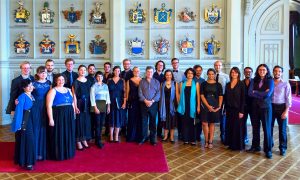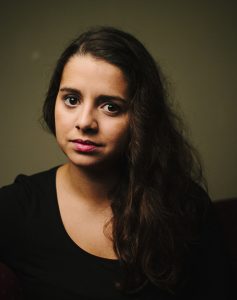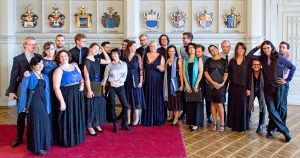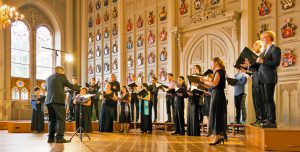Laura Lopes, singer, educator and music manager, Portugal
As the coordinator of Tenso Network Europe and as a professional singer working in choirs and ensembles I often get asked about this theme, having conducted two webinars recently about it. One of them was livestreamed and done in by invitation of the European Choral Association – Europa Cantat as part of their EPIC project – you can still find it online with the title ‘Choose and be chosen – How to get into the world of professional choirs’, and the other was part of the Walter Strauss Seminar Series organised by the Turkish State Choir. While on the first one I aimed to spark a conversation between myself and two other choral singing professionals and enthusiasts about all of the steps one might take when pursuing a career in the professional choral world, the second one focused on my personal path towards the same goal: a mix of the two is what I am presenting to you in this article.

As a young musician, I was lucky to have been enrolled in choir and solfege/ear training classes alongside my main instrument studies from eleven years of age, at the Gregorian Institute in Lisbon. While I recognise that internationally not all education systems provide music lessons as part of the national curriculum, I do believe starting from a young age in a children/youth choir not only provides the inspiration for the possibility of a career in this world but training that will definitely prove useful for the future. If you became passionate about choral singing at a later stage, do not worry: there is still a chance! One of the first steps you could take is to start with the music: what sounds and textures make you want to listen to them more, what era of music history do you find yourself drawn into, what type and size of choir do you appreciate more when you watch a concert live or listen to a recording? From this you will gather information that can make you choose what type of ensemble singer you are training to be – and then be chosen! From my personal experience I see that having studied harpsichord, Gregorian chant and overall early music during my teenage years shaped what repertoire I ended up wanting to specialise on as a soloist and one-to-a-part ensemble singer, but not necessarily as a choir singer. In my view, having different interests in music is absolutely fine and possible to combine in your career. As training goes, there are more and more options for ensemble-singing higher education courses, some aimed at solo-ensemble singers (University of York, for example) and others created in partnership with professional chamber choirs. For networking I would also recommend participating in local or international choral festivals, even as a volunteer to start with to get immersed and inspired by those around you or join Leading Voices 2022, the European days for vocal and choral leaders. Once you have established what types of choir/ensemble you appreciate listening to, sing already in a group and follow regular singing lessons to improve individual vocal awareness and technique, you might find yourself looking for the next step: young artists schemes. These come in all shapes and forms, whether as national youth choirs, international summer initiatives like the EuroChoir and Tenso Europe Chamber Choir projects, year-round young singers sibling ensembles training arranged by professional choirs, such as the NKK NXT of the Nederlands Kamerkoor or the Solistkoret UNG of the Det Norkse Solistkor, choral internships where you join a professional choir for a single project to experience the ‘real deal’, choral masterclasses, etc. A good starting point can be contacting the professional choirs and ensembles of your country that inspire you and ask if there are any initiatives of this sort in place, and if not, if they would like to start one. As a young choir singer I took part in all the summer courses I could around my hometown and made connections for life during those, and can even remember by heart a fair amount of the music I learned in them: choir singing in the professional world still is for me about the enjoyment of making music with others, and that has not changed one bit since my first group-singing experiences.
At some point you will find that you must audition to your preferred choirs, and go through applications for those. The best way to overcome the unclarity one might find in these processes is to ask, and ask again. Fill the inboxes of the choirs until you know you have the most information about how to apply, what is asked of you on the audition day, and what you can expect after: this way you can be as prepared as possible, and focus on the music when you present yourself in front of the panel. If you are studying solo singing in higher education you were probably told that hearing a ‘no’ is a regular reality, and that is the case in the professional choir world as well, but the good news is that 1. you can try again, 2. you can find your perfect fit for the moment elsewhere, 3. the choice is yours to start with! I have applied for many auditions, succeeded in some, got rejected on others, reapplied for a few and was chosen later… it is a part of the freelance life I pursue, and even if you join a choir such as a national radio or opera choir that works with a fixed term contract you might find yourself back in the audition buzz every now and then. Your musical taste, the development of your voice and your stability prospects are only some of the factors you will come back to when shaping your singing career and you will not be less successful in the end even if your path seems to go sideways sometimes. Don’t give up; keep singing and I can’t wait for us to cross paths in the choral world!
 Laura Lopes is a Portuguese mezzosoprano, music educator and arts administrator and the Coordinator of Tenso Network Europe – the European Network for professional chamber choirs since March 2020. Laura is originally from Lisbon, Portugal; she also lived in Hungary, the Netherlands and the UK, having studied Choir Conducting/Music Pedagogy at Escola Superior de Musica de Lisboa (PT), Early Music Singing at the Royal Conservatoire The Hague (NL), and Arts Policy and Management at Birkbeck College, University of London (UK). She is a freelance administrator/producer for festivals and arts organisations such as Les Azuriales Opera and the Brighton Early Music Festival and leads workshops in schools for the Voces8 Foundation as a member of its Education Team. She is active as an ensemble singer, singing throughout Europe with professional vocal ensembles and chamber choirs, is the Choir Coordinator for Orquestra XXI and also works as a consultant for ensembles and concert series. Email: info@tensoeuropechamberchoir.eu
Laura Lopes is a Portuguese mezzosoprano, music educator and arts administrator and the Coordinator of Tenso Network Europe – the European Network for professional chamber choirs since March 2020. Laura is originally from Lisbon, Portugal; she also lived in Hungary, the Netherlands and the UK, having studied Choir Conducting/Music Pedagogy at Escola Superior de Musica de Lisboa (PT), Early Music Singing at the Royal Conservatoire The Hague (NL), and Arts Policy and Management at Birkbeck College, University of London (UK). She is a freelance administrator/producer for festivals and arts organisations such as Les Azuriales Opera and the Brighton Early Music Festival and leads workshops in schools for the Voces8 Foundation as a member of its Education Team. She is active as an ensemble singer, singing throughout Europe with professional vocal ensembles and chamber choirs, is the Choir Coordinator for Orquestra XXI and also works as a consultant for ensembles and concert series. Email: info@tensoeuropechamberchoir.eu



